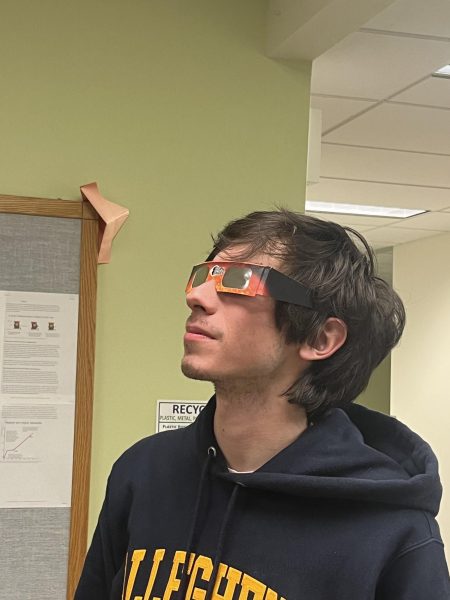How students can harness the power of performance anxiety
Students have all experienced nervousness and fear before an exam or before hitting the stage for a presentation or sports competition. Sometimes, this performance anxiety pushes students to excel, while at other times an overload of this anxiety can really paralyze their ability to perform. This phenomenon can be explained by the Yerkes-Dodson Law. Although it has a funny name, the Yerkes-Dodson Law plays an important role in the lives of college students. This law helps explain the relationship between stress and performance. Stress in this case is measured by level of arousal. The law dictates that for simple tasks, performance increases with an increase of physiological or mental arousal. For difficult tasks, performance also increases with physiological or mental arousal, but if arousal levels become too high, performance starts to decrease.
This performance anxiety can be due to many factors. One of which is the spotlight effect, which suggests that individuals tend to see themselves at center stage causing them to overestimate the extent to which other people are paying attention to them, increasing their arousal. To prove this, researchers at Cornell University had students wear an embarrassing t-shirt before entering class. They then asked the t-shirt wearers to guess how many people they think noticed their embarrassing shirt. The students wearing the t-shirts guessed that about 50% of the other students noticed, while in reality, only 23% of them did. Social psychology also explains that people often suffer from an illusion of transparency, which is the belief that concealed emotions leak out and can easily be read by others. Therefore, if one is nervous, they assume everyone will notice. Well in reality, people are actually more opaque than they realize.
The Yerkes-Dodson Law clearly relates a “sweet spot” in arousal to peak performance, in which there exists an optimal amount of arousal that facilitates the best performance. In accomplishing simple and well-practiced tasks, arousal tends to improve performance of those tasks, a phenomenon known as social facilitation. When individuals perform in front of others — as opposed to with others — performance anxiety also results in improved performance. This is rooted in our fear of being evaluated harshly by others, a phenomenon known as evaluation apprehension.
In a 1968 study conducted by Henchy and Glass, subjects were trained to learn how to pronounce a series of nonsense words. The subjects received more “practice” with some words than with others. After the training period, subjects were shown flashes of the words on the screen very fast and told to state what word was on the screen. The subjects were randomly assigned to one of four groups: alone, in the presence of two “experts,” in the presence of two non-experts, and alone but recorded for review by experts. The heart rates of subjects were also monitored throughout to measure arousal. The subjects were able to recall words that were practiced more when in the presence of “experts.” Thus, Henchy and Glass concluded that the presence of evaluation apprehension strengthens dominant — or well-practiced — responses at the loss of subordinate (or less-practiced) responses.
Although performance anxiety can cause just enough arousal to lead to better performance, it can also cause performance to be worse. Too much or too little arousal can be troublesome and lead to choking. And yes, choking IS a real thing. According to Mesagno in 2012, choking is characterized by a subpar performance due to the pressures of a situation. Social facilitation, defined above, is a factor that plays a role in whether or not somebody will choke.
In a study conducted in 2001 by Williams et al. involving table tennis players, the players reported more anxiety when the task was more difficult. The performance of the table tennis players on the more difficult task was worse than the easier task. Thus, somebody performing a difficult task in front of others will have a higher chance of choking because of the heightened anxiety and arousal. The beliefs of the audience also can play a role in the performance. According to the self-fulfilling prophecy, one’s behaviors can impact how others behave. Therefore, if an audience behaves or acts uninterested in a performance, the behavior of the performer may be altered. This is why cheering and chanting at sports games can actually make a difference. The behavior of the performer may change due to the performer becoming more anxious, which can lead to choking.
So what can students do to use performance anxiety to their advantage in their next school or work obstacle? Social psychology shows that practice truly does make perfect. Students should practice tasks repeatedly until they become relatively simple and straightforward so that students can harness the power of social facilitation in their next big exam or job interview to showcase dominant and desirable responses. Sian Beilock is a psychologist that studies choking under pressure. She explains that behaviors in which individuals focus heavily on the fine details, tend to be compromised in high pressure situations. To avoid this, Beilock recommends distracting one’s mind when faced with a high pressure situation and to rationalize fears associated with performance anxiety before completing the task. According to Mesagno & Beckmann (2017), sports psychologists also recommend implementing a “pre-performance routine” to distract athletes before a big game. This aims to shift the focus of the task at hand to behaviors that the athletes know very well. This can be adapted in the lives of college students, for example, by implementing a “pre-exam ritual” instead. Moreover, according to Jason Kelly from the University of Chicago, practicing under pressure with simulated conditions, will make the real task much less daunting.
Some arousal must exist to ensure the best performance. Therefore, students should ensure that they are motivated to be evaluated well by others. Using evaluation apprehension can lead to better performance when one is truly motivated to be perceived favorably by others. Some arousal is completely normal and healthy according to the Yerkes-Dodson Law, so it should not be concerning if nerves are present before a performance. It is when the nerves are either too high or too low that can spell trouble and some of the previously mentioned methods should be used to combat performance anxiety.






